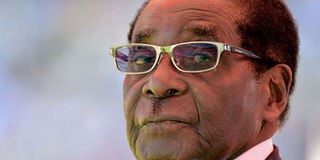Curtain falls on Jawara and Mugabe

Zimbabwe President Robert Mugabe looks on during his inauguration and swearing-in ceremony at the sports stadium in Harare on August 22, 2013. Mugabe faced Africa’s neo-colonial detractors with exceptional courage. PHOTO | ALEXANDER JOE | AFP
What you need to know:
- Jawara’s regime was considered one of the most democratic in Africa, and he was described as a man of peace and patriotism.
- Despite his failings, Mugabe dedicated his early years to the emancipation and empowerment of his people.
In a strange twist of fate, Africa has lost two founding fathers, Gambia’s Dawda Jawara and Zimbabwe’s Robert Mugabe in less than a fortnight.
Relatively low-key, the former was a promoter of human rights and was known for tolerance, kindness and a sense of humour.
His Zimbabwean counterpart was a different kettle of fish. Not surprisingly, Mugabe’s death captured world headlines.
Despite being vilified by Western media, Mugabe still ranked right up there with Africa’s most revered freedom fighters.
Not only was he Zimbabwe’s founding father, Mugabe faced Africa’s neo-colonial detractors with exceptional courage.
A legendary gladiator clearly wrought from the finest mould, he rose to the occasion whenever duels with his western critics beckoned.
Ironically, the death on Friday came even as the World Economic Forum was taking place in South Africa.
DEMOCRACY
Jawara died on Tuesday, August 27, also aged 95. A Glasgow-trained vet, he led Gambia to independence from the British in 1965.
Having become Gambia’s first prime minister in 1962, he held onto the post until the country gained independence a few years later.
The new-found freedom ended British rule that began in 1888. It was not until 1970 that Jawara assumed the post of president.
Jawara’s regime was considered one of the most democratic in Africa, and he was described as a man of peace and patriotism.
He was overthrown in a bloodless coup by 29-year-old Yahya Jammeh in July 1994. The latter ruled the tiny west African state for 22 years, even as the man he overthrew sought refuge in the UK, where he lived with his family up to 2002.
He returned home when Jammeh granted him amnesty, with his seized assets returned to him.
LEGACY
He was buried at the National Assembly complex in Banjul on Thursday.
Mugabe was a fearless gladiator known for fighting toe-to-toe with his most formidable opponents.
Outrageously controversial, he was loved and detested in equal measure.
Ultimately a true pan-Africanist and an icon of liberation. Despite his failings, Mugabe dedicated his early years to the emancipation and empowerment of his people.
His contribution to the history of the continent and to liberation struggles everywhere will remain legendary.
Clearly, that is one aspect of the Mugabe mystique that is unlikely to ever be forgotten.





